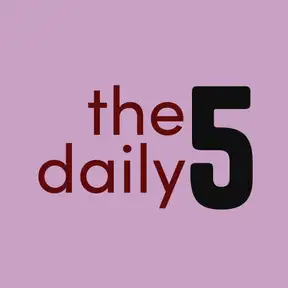
The stories we tell ourselves
[00:00:00] **Aurooba Ahmed:** Well, hello! This is The Daily Five with Aurooba, that's me, where we reflect on creating our best lives a little bit every day. Here we go.
[00:00:15] A couple episodes ago, I mused on the podcast that I don't know why it's so easy to do certain things and so hard to do the others. And then I talked about a theory I had, but I also said that I had another theory forming in my mind, because this is something I have been pondering for a few days, and there is a particular reason why I have been pondering it more lately.
[00:00:39] You see, tomorrow is the start of Ramadan, a time when practicing Muslims around the world abstain from all food and drink from dawn till sunset. It is my favorite time of the year, regardless of when it comes. The Islamic calendar is a lunar calendar, so on the Gregorian calendar, the Islamic months, of which Ramadan is one, moves around, typically going backwards a few days every year.
[00:01:07] I have fasted from dawn to sunset, when that period of time was twenty one hours. I have fasted from dawn to sunset, when that period of time was eight hours or less. I have loved every Ramadan, and I have fasted since I was six. Most of us who fast will typically smile and dismiss it when people ask whether it's hard. We persist. We delight in it. We are proud of our ability to do it.
[00:01:36] Ramadan is a time of community, worship, spirituality, and for many of us, it's a deep reset with many benefits. Something I would love to do an episode on later, but today is not that day. There are many, many reasons to love Ramadan. Most Muslims see it as a joyous time.
[00:01:55] Each dawn is beautiful. Each sunset filled with gratitude.
[00:02:00] Not even water? As the meme goes, when non Muslims hear about fasting, that's what they ask. And we respond, yes, not even water, usually with a chuckle or a smile. Now here's the thing, we could say that our faith forces this on us, our community forces this on us, peer pressure, etc, what have you. That we endure it because we must.
[00:02:32] But if you asked a practicing Muslim, do you know what they would say? They would say something along the lines of, we don't have to fast, we get to fast. Even the ill and the weak will protest and fight against anyone who won't let them fast. I cannot tell you how many times someone in my family was ill and should not be fasting and we had to argue with them so that they would not fast for their own health.
[00:02:59] I was eight. I was stuck in an airport because of a bombing for more than 24 hours. I was hungry. I was tired. Eventually, I got to be on the plane, and when the flight attendant brought me something to eat, I refused. I argued, and I would not take food or drink, because I was fasting, and I was proud to do so.
[00:03:22] It is an honor, a privilege, an act of not only great empathy, but of deep worship.
[00:03:28] That is the story we tell ourselves. We choose the narrative that gives us agency, the story that empowers and lifts. And see, the stories we tell ourselves, the narratives we repeat to ourselves and to each other can be so powerful that more than a billion people around the world, regardless of how north or south they are, regardless of how hot or cold a part of the world is, regardless of how much food or money they have, willingly forego all food and drink from dawn to sunset every single day for nearly 28 days between the sighting of one crescent moon and the next.
[00:04:04] And they look up at the skies and they thank the Lord that they got to do it.
[00:04:10] Isn't that fascinating? I find that fascinating. In other people, in myself, wow.
[00:04:19] Self discipline, it gets a bad, bad rap, you know, it says we have to do something, even if the person saying that is ourselves, but agency, weaving a story that puts you firmly in control, that empowers you, well, that is something else quite magical, entirely, as the story of fasting and Ramadan tell us.
[00:04:49] Thanks for listening. Same time tomorrow?
